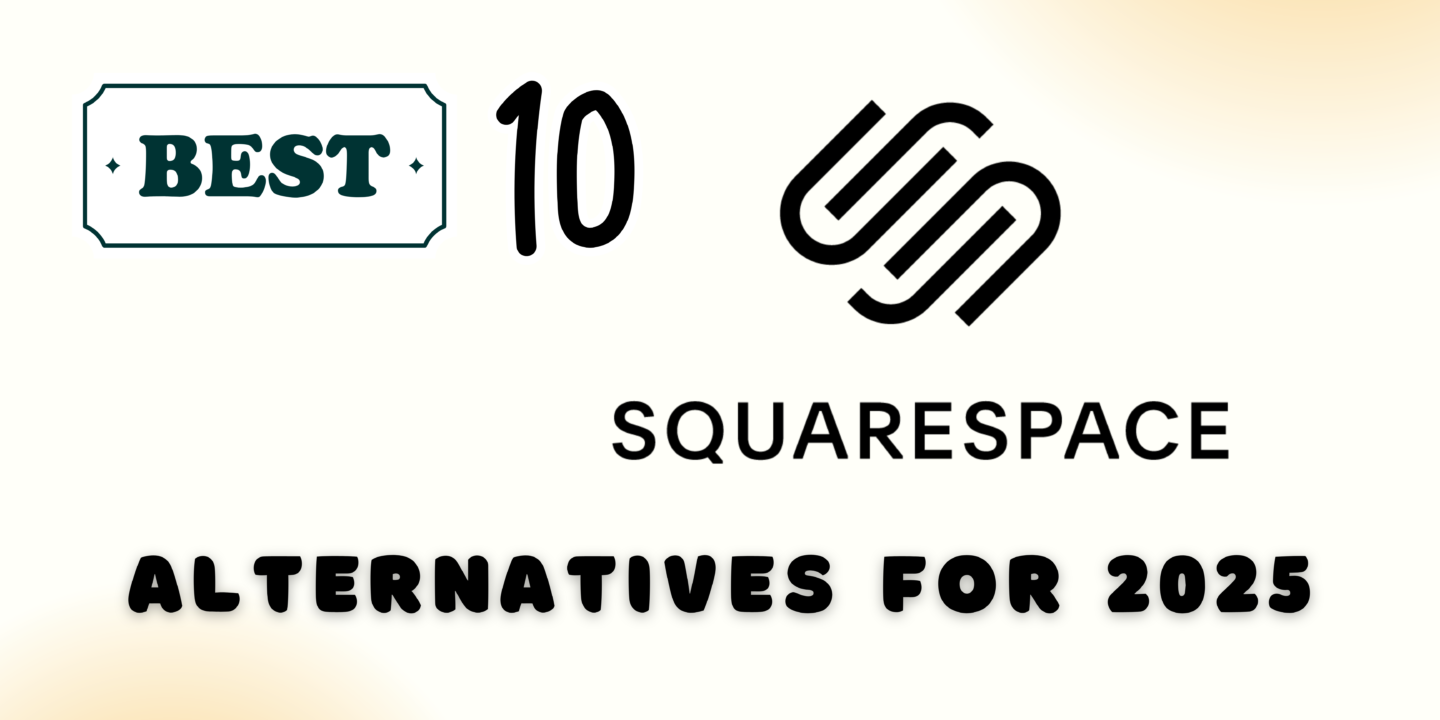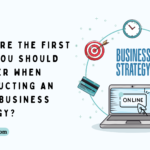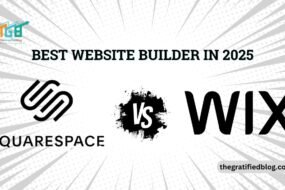
Building a website has never been easier, thanks to a variety of website builders offering intuitive tools and powerful features.As technology evolves, website builders continue to improve, introducing AI-powered design, no-code development, and enhanced performance features. Whether you prioritize simplicity, creative freedom, or business growth, there are plenty of alternatives to explore. In this article, we’ll explore the best 10 Squarespace alternatives available today, helping you make an informed decision about the best platform for your website in 2025.
What Is Squarespace?
Squarespace is an all-in-one website builder that enables users to create professional websites, online stores, and portfolios without coding. Known for its sleek templates and intuitive drag-and-drop interface, it simplifies web design for beginners while offering advanced customization for experienced users.
However, while Squarespace is a popular choice, many users seek Squarespace alternatives that offer different features, pricing, or design flexibility.
Key Features Of Squarespace
- Website Builder – Drag-and-drop functionality for easy custom layouts, suitable for beginners and experienced developers.
- E-commerce Platform – Set up an online store, manage inventory, and process payments efficiently.
- Blogging Tools – Supports multi-author blogging, RSS feeds, and post scheduling.
- Search Engine Optimization (SEO) – Built-in SEO tools, including clean URLs and image alt tags, to improve search rankings.
- Analytics – Comprehensive insights into website performance, visitor demographics, and traffic sources.
- Customer Support – 24/7 live chat and email support, plus a knowledge base with guides and community answers.
- Drag-and-Drop Editor – Intuitive interface for effortless website customization.
- Mobile Optimization – Fully responsive designs for seamless browsing on smartphones and tablets.
- Domains & Security – Secure hosting, free SSL certificates, and domain registration services.
- Marketing Tools – Integrated email campaigns, social media integration, and promotional features.
Users Of Squarespace
Squarespace is popular among a wide range of users, including:
- Small Business Owners – Entrepreneurs use it to create professional websites without needing coding skills.
- Freelancers & Creatives – Photographers, designers, writers, and artists use it to showcase their portfolios.
- E-commerce Businesses – Online store owners sell products using built-in tools.
- Bloggers & Content Creators – Writers and influencers create blogs with customizable templates.
- Nonprofits & Organizations – Charities and community groups use Squarespace to raise awareness and collect donations.
Squarespace Pricing
Squarespace offers various pricing plans designed to meet different website needs. For the most up-to-date and detailed information, visit Squarespace pricing page.
Why Look For Squarespace Alternatives?
While Squarespace is a powerful website builder, users may seek Squarespace alternatives for greater flexibility, unique features, or different pricing structures. Here’s why some users explore other options:
- Customization & Design Flexibility – Wide template selection with full customization, including HTML, CSS, and JavaScript editing.
- Ease of Use – Intuitive drag-and-drop builder with minimal learning curve, ideal for beginners.
- Affordable & Transparent Pricing – Clear, cost-effective plans with no hidden fees and free trial options.
- SEO & Performance Optimization – Built-in SEO tools, fast loading speeds, and mobile-friendly design.
- E-commerce Capabilities – Secure payment integrations, inventory management, and shipping options.
- Blogging & Content Management – Advanced blogging tools with scheduling, categories, and integrations.
- Scalability & Growth Potential – Suitable for businesses, portfolios, and online stores with collaboration tools.
- Hosting & Security – Reliable hosting, SSL certificates, daily backups, and strong security features.
- Third-Party Integrations – Supports CRM, marketing tools, analytics, and API access for custom needs.
- Customer Support & Community – 24/7 support via chat, email, or phone, plus active user resources.
Top 10 Squarespace Alternatives In 2025
If you’re looking for Squarespace alternatives, several website builders offer powerful features, better pricing, or enhanced customization. Here are the best 10 options to explore:
1. Shopify
Shopify is a comprehensive e-commerce platform that enables businesses to create and manage online stores with ease.
Key Features:
- User-Friendly Interface: Intuitive design allows for easy store setup and management without extensive technical knowledge.
- Customizable Templates: Access to a wide range of themes to tailor your store’s appearance.
- Integrated Payment Processing: Supports multiple payment gateways, including Shopify Payments, ensuring seamless transactions.
- Mobile Optimization: Responsive designs ensure optimal viewing across various devices.
- App Store: Offers numerous apps to extend functionality, from marketing tools to inventory management.
- 24/7 Support: Provides round-the-clock assistance via chat, email, or phone.
Pros:
- Scalability: Suitable for businesses of all sizes, from startups to large enterprises.
- Comprehensive Features: All-in-one solution covering hosting, security, and software updates.
- Global Reach: Supports multiple languages and currencies, facilitating international sales.
- Robust Security: Ensures data protection with Level 1 PCI DSS compliance.
Cons:
- Transaction Fees: Additional fees apply when using third-party payment gateways.
- Cost: Monthly fees can be higher compared to some competitors, especially for advanced plans.
- Customization Limitations: Some advanced customizations may require coding knowledge or hiring a developer.
Pricing Plans:
Check out the Shopify pricing page for detailed pricing information.
2. Wix
Wix is a versatile website builder offering a range of features suitable for various users, from individuals to small businesses.
Key Features:
- Drag-and-Drop Editor: Easily design websites without coding knowledge.
- Extensive Template Library: Access over 900 professionally designed, customizable templates.
- AI Tools: Utilize AI for website design (Wix ADI) and content creation.
- E-commerce Capabilities: Sell products online with integrated payment processing.
- App Market: Enhance functionality with a wide range of third-party apps.
- SEO and Marketing Tools: Optimize site visibility and engage audiences effectively.
Pros:
- User-Friendly Interface: Ideal for beginners with its intuitive design.
- Design Flexibility: Full creative control over site appearance.
- Comprehensive Features: Built-in tools for various website needs, including blogs and online stores.
- Regular Updates: Continuous improvements and feature additions.
Cons:
- Template Lock-In: Changing templates requires rebuilding the site.
- Pricing: Higher cost compared to some competitors.
- Loading Speeds: Large websites may experience slower performance.
- Limited Scalability: May not be ideal for very large or complex sites.
Pricing Plans:
Visit Wix pricing page to explore their plans and costs.
3. WordPress
WordPress is a widely-used open-source content management system (CMS) that enables users to create and manage websites with extensive customization options.
Key Features:
- Customizable Themes and Plugins: Access to thousands of free and premium themes for personalized design. Over 58,000 plugins to enhance functionality, including SEO optimization, social media integration, and e-commerce capabilities.
- Advanced Editing and Design: Block-based editor simplifies content layout. Developers can utilize HTML, CSS, and PHP for deeper customization.
- SEO-Friendly Structure: Built-in features and plugins like Yoast SEO enhance search engine visibility.
- Responsive Design: Most themes are mobile-compatible, ensuring a seamless user experience across devices.
Pros:
- Flexibility: Suitable for various website types, from personal blogs to full-fledged e-commerce sites.
- Strong Community Support: A large, active community offers extensive resources, tutorials, and forums.
- Scalability: Capable of handling websites of all sizes, from small personal blogs to large corporate sites.
- Extensive Plugin Ecosystem: Wide range of plugins available to add functionality and features.
Cons:
- Security Vulnerabilities: Being widely used makes it a target for hackers; requires regular updates and security measures.
- Maintenance Requirements: Users are responsible for updates, backups, and general site maintenance.
- Performance Issues: Improper use of plugins or themes can lead to slow loading times.
- Learning Curve: Advanced customization may require technical knowledge and familiarity with coding.
Pricing Plans:
Get all the pricing details on the WordPress pricing page.
4. Webflow
Webflow is a versatile website builder that empowers users to design, build, and launch responsive websites without writing code.
Key Features:
- Visual Design Interface: Drag-and-drop functionality allows real-time design adjustments.
- Responsive Design: Ensures optimal viewing across desktops, tablets, and mobile devices.
- Built-in CMS: Manage dynamic content with customizable structures.
- Custom Animations: Create interactive elements with triggers and animations.
- SEO Tools: Optimize metadata, URLs, and alt text directly within the platform.
- Hosting and Security: Fast load times with free SSL certification.
Pros:
- Design Flexibility: Full control over website aesthetics without coding.
- No Plugins Required: Eliminates the need for third-party plugins, reducing maintenance.
- Collaboration Features: Teams can simultaneously design and edit content.
- Fast Prototyping: Accelerates development with live prototyping.
- Secure Hosting: AWS-powered hosting ensures reliability and security.
Cons:
- Learning Curve: Beginners may need time to master the platform.
- Limited Code Customization: Advanced code modifications can be restrictive.
- No Mobile App: Edits must be made on desktop; no mobile editing capabilities.
- E-commerce Limitations: May lack advanced features required by large-scale online stores.
- Dependency on Platform: Reliance on Webflow’s hosting and services.
Pricing Plans:
Find Webflow pricing breakdown on their official pricing page.
5. Weebly
Weebly is a user-friendly website builder that enables individuals and businesses to create professional websites with ease.
Key Features:
- Drag-and-Drop Builder: Easily design pages without coding knowledge.
- Responsive Themes: Access a variety of customizable, mobile-friendly templates.
- Integrated E-commerce: Set up online stores with features like inventory management and secure checkout.
- App Center: Enhance functionality with various third-party applications.
- SEO Tools: Optimize your site for search engines with built-in tools.
- Mobile App: Manage your site and store on-the-go with Weebly’s mobile applications.
Pros:
- Ease of Use: Intuitive interface suitable for beginners.
- Comprehensive Features: Offers a range of tools for website building and online selling.
- Cost-Effective: Provides a free plan and competitively priced premium plans.
- Custom Code Access: Advanced users can edit HTML/CSS for deeper customization.
Cons:
- Limited Design Flexibility: Customization options may be restrictive for advanced designers.
- Basic Blogging Platform: Lacks advanced features for professional bloggers.
- Transaction Fees: Charges a 3% fee on lower-tier e-commerce plans.
- Template Lock-In: Switching templates requires rebuilding content.
Pricing Plans:
Visit the Weebly pricing page to see the available plans and their costs.
6. Jimdo
Jimdo is a user-friendly website builder designed to help individuals and small businesses create professional websites without requiring extensive technical skills.
Key Features:
- Two Website Builders: Jimdo offers ‘Dolphin,’ an AI-driven builder that creates a personalized website based on user responses, and ‘Creator,’ a more hands-on, drag-and-drop editor for greater design flexibility.
- Responsive Templates: Access to a variety of customizable templates optimized for mobile devices.
- E-commerce Functionality: Integrated tools for setting up online stores, including inventory management and multiple payment options.
- Blogging Platform: Built-in features to easily add and manage a blog on your website.
- SEO Tools: Basic tools to optimize your site for search engines, enhancing online visibility.
- Multilingual Support: Ability to create websites in multiple languages to reach a broader audience.
Pros:
- Ease of Use: Intuitive interfaces in both builders make website creation accessible to beginners.
- Quick Setup: The Dolphin AI builder can generate a basic website in minutes based on user input.
- Affordable Pricing: Competitive pricing plans suitable for personal projects and small businesses.
- No Transaction Fees: Jimdo does not charge additional fees on sales made through its e-commerce platform.
- Mobile Optimization: Templates are designed to be responsive, ensuring a good user experience across devices.
Cons:
- Limited Design Flexibility: Customization options may be less extensive compared to other platforms, potentially restricting unique design elements.
- Basic SEO Features: SEO tools are relatively simple and may not meet the needs of users requiring advanced optimization capabilities.
- Limited Customer Support: Support is primarily available through email, with response times varying by plan; no live chat or phone support is offered.
- Page Limits on Lower Plans: Some plans restrict the number of pages you can create, which may be limiting for larger websites.
- Template Variety: The selection of templates is smaller compared to some competitors, which might limit design choices.
Pricing Plans:
For a complete overview of pricing, head to Jimdo pricing page.
7. Webnode
Webnode is a user-friendly website builder that enables individuals and businesses to create professional websites without coding knowledge.
Key Features:
- Multilingual Support: Easily create websites in multiple languages to reach a global audience.
- Responsive Templates: Access over 100 customizable templates optimized for various devices.
- Drag-and-Drop Editor: Design pages effortlessly by positioning elements directly on the page.
- E-commerce Functionality: Set up online stores with integrated payment options and inventory management.
- SEO Tools: Optimize your site with built-in features to enhance search engine visibility.
- Custom Domain and Email: Connect your own domain and create professional email addresses.
Pros:
- Ease of Use: Intuitive interface suitable for beginners.
- Affordable Pricing: Competitive plans, including a free option.
- Multilingual Capabilities: Simplifies the creation of multi-language websites.
- Backup and Restore: Ability to create and restore website backups.
- Mobile Editing: Manage and edit your website from mobile devices.
Cons:
- Limited Customization: Design flexibility may be restricted compared to other platforms.
- Basic Blogging Features: Lacks advanced blogging tools and functionalities.
- No App Store: Absence of an integrated app market for third-party extensions.
- Template Lock-In: Changing templates requires rebuilding the site.
- Performance Issues: Potential for slower loading times on mobile devices.
Pricing Plans:
Explore pricing options by visiting the Webnode pricing page.
8. Dorik
Dorik is a no-code website builder designed to help users create professional websites efficiently, without requiring coding skills.
Key Features:
- AI Website Generation: Utilize AI to generate complete websites, including content and images, based on user prompts.
- Drag-and-Drop Builder: An intuitive interface that allows users to design and customize websites effortlessly.
- White-Label CMS: Enables agencies and freelancers to build and manage client websites under their own brand.
- Airtable Integration: Seamlessly connect and display Airtable data within your website.
- Responsive Templates: Access to over 100 customizable templates optimized for various devices.
- SEO Optimization: Built-in tools to enhance website visibility on search engines.
- Blogging Platform: Integrated system for creating and managing blogs.
- Membership Sites: Ability to create membership-based content with restricted access.
Pros:
- User-Friendly Interface: Suitable for beginners with its easy-to-navigate design tools.
- Comprehensive Feature Set: Combines website building, blogging, e-commerce, and client management in one platform.
- Affordable Pricing: Offers competitive plans, including a free option.
- Responsive Customer Support: Provides assistance to users as needed.
- Regular Updates: Continuously adds new features and improvements.
Cons:
- Limited Advanced Customization: May not offer extensive design flexibility for highly unique designs.
- Template Variety: Smaller selection compared to some competitors.
- Learning Curve for Complex Features: Advanced tools like e-commerce setup and SEO may require time to master.
- Integration Limitations: Fewer third-party applications compared to other platforms.
Pricing Plans:
Learn more about Dorik’s pricing structure on Dorik pricing page.
9. Pixpa
Pixpa is an all-in-one website builder tailored for creative professionals, enabling users to create and manage professional websites without coding skills.
Key Features:
- Portfolio Galleries: Customizable galleries to showcase various media formats.
- E-commerce Integration: Tools for product catalogs, inventory management, and multiple payment options.
- Client Proofing: Private, password-protected galleries for client reviews and feedback.
- Blogging Platform: Integrated blog with customizable templates and SEO-friendly features.
- Responsive Design: Templates that adapt to different screen sizes.
- SEO Tools: Built-in settings for meta tags, alt text, and customizable URLs.
- Third-Party Integrations: Connections with various services to enhance website functionality.
Pros:
- User-Friendly Interface: Drag-and-drop builder suitable for users without technical expertise.
- Comprehensive Feature Set: Combines portfolios, e-commerce, blogging, and client proofing in one platform.
- Affordable Pricing: Competitive plans ideal for freelancers and small businesses.
- Responsive Customer Support: 24/7 assistance via chat and email.
- Mobile Optimization: Ensures websites are accessible and functional across all devices.
Cons:
- Limited Advanced Customization: May not offer extensive design flexibility for highly unique designs.
- Template Variety: Smaller selection compared to some competitors.
- Learning Curve for Complex Features: Advanced tools like e-commerce setup and SEO may require time to master.
- Integration Limitations: Fewer third-party applications compared to other platforms.
Pricing Plans:
Discover pricing plans by checking out Pixpa pricing page.
10. Site123
SITE123 is a user-friendly website builder designed to help individuals and businesses create professional websites without requiring coding skills.
Key Features:
- Intuitive Website Editor: Easily build and customize websites with a straightforward editor.
- Responsive Design: All templates are mobile-friendly, ensuring optimal display on various devices.
- Free Hosting: Secure and reliable hosting is included with all plans.
- SEO Tools: Built-in features to enhance search engine visibility.
- Custom Domains: Option to connect your own domain or purchase one through SITE123.
- E-commerce Capabilities: Set up an online store to sell products globally.
- 24/7 Live Support: Access to round-the-clock assistance via live chat.
Pros:
- Ease of Use: Ideal for beginners with no design or coding experience.
- Quick Setup: Create and publish a website in less than an hour.
- Multilingual Support: Ability to create websites in multiple languages.
- Affordable Pricing: Competitive plans suitable for various budgets.
- No Ads on Premium Plans: Upgrade to remove SITE123 branding from your site.
Cons:
- Limited Design Flexibility: Customization options may be less extensive compared to other platforms.
- Basic Blogging Functionality: Lacks advanced features for professional bloggers.
- Limited Third-Party Integrations: Fewer app integrations compared to competitors.
- Storage and Bandwidth Limits: Higher-tier plans may be required for extensive media content.
Pricing Plans:
To see Site123’s latest pricing details, visit Site123 pricing page.
Which Squarespace Alternative Is Right For You?
Choosing the right Squarespace alternative depends on your priorities—whether it’s ease of use, design flexibility, SEO & marketing features, e-commerce capabilities, or pricing. Let’s break it down:
1. Ease of Use
- 🏆 Winner: Wix
- Why? Intuitive drag-and-drop builder, beginner-friendly interface, and AI-powered website creation.
- Other Good Options: Weebly (simple site-building process), Shopify (easy for e-commerce).
2. Design Flexibility
- 🏆 Winner: Webflow
- Why? Highly customizable, advanced animations, full design control with no coding required.
- Other Good Options: WordPress.com (themes + page builders), Wix (good templates but less advanced customization).
3. SEO & Marketing Features
- 🏆 Winner: WordPress.com
- Why? Extensive SEO plugins (Yoast, Rank Math), full content control, built-in blogging tools.
- Other Good Options: Shopify (strong SEO for e-commerce), Wix (basic built-in SEO tools).
4. E-Commerce Capabilities
- 🏆 Winner: Shopify
- Why? Advanced inventory management, multi-channel selling (Amazon, Instagram), built-in payment processing.
- Other Good Options: BigCommerce (scalable), Wix eCommerce (cheaper but less powerful than Shopify).
5. Pricing & Value for Money
- 🏆 Winner: Wix
- Why? Competitive pricing, free plan available, solid features for businesses and creatives.
- Other Good Options: Weebly (most affordable), WordPress.com (low-cost but requires add-ons for full functionality).
How To Choose The Best Squarespace Alternative For Your Needs?
Here’s a breakdown of the best alternatives based on different user needs:
Best for Small Businesses: Wix
- Why? Offers a drag-and-drop builder, extensive templates, and built-in business tools.
- Key Features: Customizable themes, SEO tools, business apps, and a free plan.
Best for Bloggers: WordPress.com
- Why? Provides ultimate flexibility and control over content, with thousands of themes and plugins.
- Key Features: SEO optimization, content scheduling, extensive third-party integrations.
Best for E-Commerce: Shopify
- Why? Specializes in online stores with powerful sales and marketing tools.
- Key Features: Secure payments, abandoned cart recovery, multi-channel selling.
Best for Designers & Developers: Webflow
- Why? Offers extensive customization, no-code/low-code options, and full control over design.
- Key Features: Advanced animations, CMS functionality, custom code integration.
Final Thoughts
Finding the right website builder depends on your needs, budget, and technical expertise. While some platforms prioritize ease of use with simple drag-and-drop interfaces, others focus on deep customization, making them ideal for those with design or coding experience. Many Squarespace alternatives now offer built-in SEO tools, eCommerce capabilities, and responsive templates to help users create professional websites effortlessly.
Pricing varies widely, with some platforms providing affordable plans for personal projects and others catering to businesses with advanced features. Exploring Squarespace alternatives can help you find a solution that offers greater flexibility, scalability, and control over your website, ensuring it meets your specific requirements.








No Comments